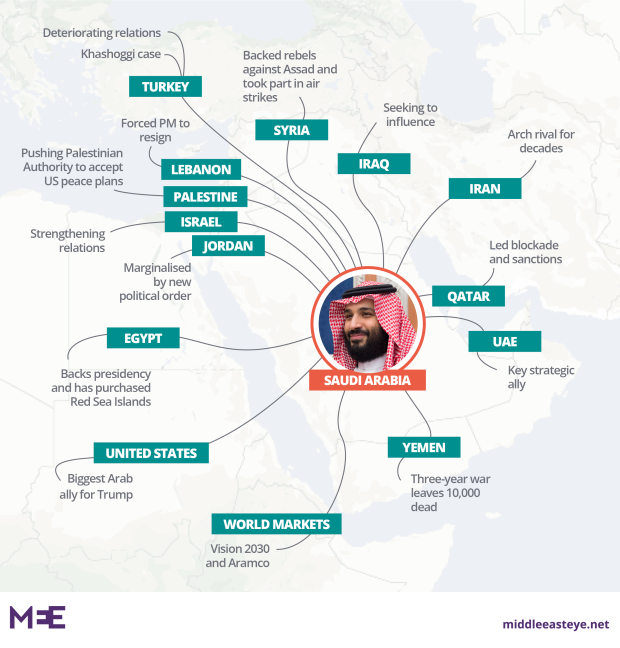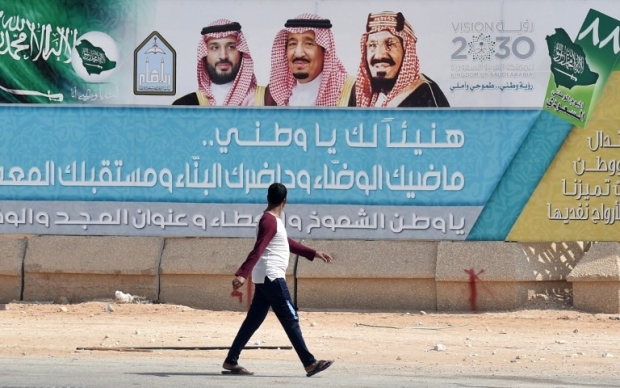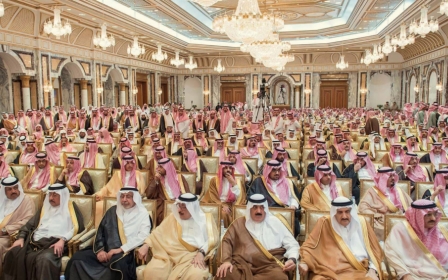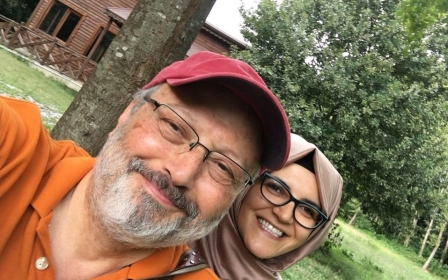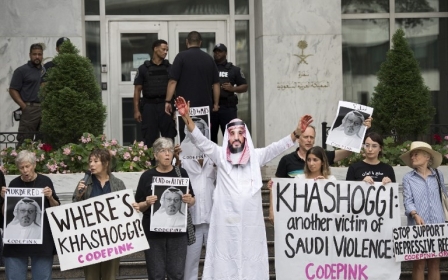Can Saudi Arabia survive without the House of Saud?
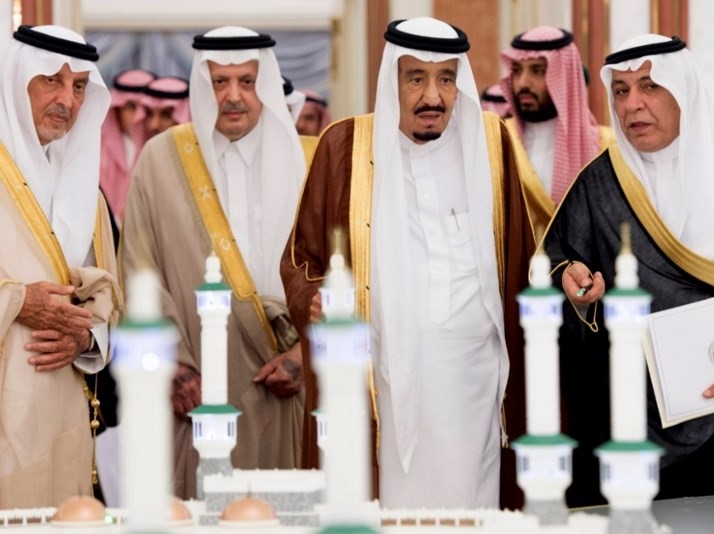
In 1974 the late Professor Fred Halliday published his iconic and provocative book entitled Arabia without Sultans. He envisaged an Arabia free from the grip of unelected sheikhs, emirs, sultans and kings, and without the patronage of Britain and later US imperial control. Forty four years later, we might ask ourselves the same question with regard to Saudi Arabia in the aftermath of the Jamal Khashoggi affair.
Arabia without Sultans
The kingdom today faces an unprecedented series of challenges. The Khashoggi affair has proven that the kingdom is run by reckless leaders who rule with an iron fist, and are possibly willing to go as far as murdering a critical journalist abroad while detaining hundreds of activists at home.
With blood spilt in Istanbul, the brutality of the core element in the Saudi regime is exposed to a global community in shock
For many Western governments today, the thought of Arabia without sultans is unthinkable, yet business as usual, following Khashoggi's murder, is intolerable. So today can we envisage Saudi Arabia without the Al-Saud or indeed any royalty? And if we can, what would be the consequences?
On the face of it, Arabia without the Al-Saud is inconceivable. After all, the country has been defined in terms of that family since its foundation in 1933. But surely after so long it would not cease to exist as a country merely because its ruling family disappears from the political scene. In fact, it may be a renaissance that liberates its latent potential and mobilises its now educated young population that has been shackled by an absolute monarchy for 85 years.
Absolute monarchy
Let’s go beyond the ambiguous reform, attributed to the young crown prince Mohammad bin Salman since he was appointed by his father King Salman. By definition reform implies a good and solid foundation upon which to add a series of incremental measures. Evolutionary rather than revolutionary change is applauded because the world cannot afford to have a revolution in the most important oil-producing country.
But the solid foundation is now proving to be in trouble. Whether the state is rogue - or elements within it are - the absolute monarchy is no longer a force of security for the people, the region, or the international community with its governments and corporations.
The murder is the culmination of a persistent and systematic targeting and repression of a whole range of activists, dissidents, and frankly anybody who dares to express a critical opinion
With blood spilt in Istanbul, the brutality of the core element in the Saudi regime is exposed to a global community in shock. The murder of Khashoggi is a watershed in the relationship between Saudi Arabia and its Western allies. Yet the murder is the culmination of a persistent and systematic targeting and repression of a whole range of activists, dissidents, and frankly anybody who dares to express a critical opinion.
If the domestic situation is bad, regionally the monarchy’s record has been abysmal. From thwarting the impulse towards democracy in the Arab world, forcing the resignation of an Arab prime minister, saturating the public sphere with treacherous sectarian discourse, to launching a murderous war with Western weapons in Yemen, the regime has disappointed its Western allies who had always regarded it as a force for stability in the turbulent Arab region.It is now time to consider the alternative. So what would Saudi Arabia without sultans look like?
Civil war
One nightmare scenario for the West - and Saudis - is for Saudi Arabia to become a caliphate, along the lines of the Islamic State. The idea that the world’s largest oil reserves are in the hands of such a group constitutes the worst-case scenario for just about everybody.
But this alarmist vision is both flawed and ill-informed. This will be a back-to-the-future scenario. Saudi Arabia was founded as a jihadi project and the current regime embodies most of the tenets of an Islamic state. From flogging, public beheading to sectarianism, the Saudi regime has exhibited most of the characteristics of that entity, so why replace one with another.
Despite this grim picture, Saudi Arabia comprises an increasingly educated society with aspirations more akin to high growth economies and the affluent West. Yes, some Saudis are deeply religious and conservative but let’s not confuse deep faith with political fanaticism.
Should a civil war erupt, it would be much worse than the Lebanese, Syrian, and Iraqi ones. There will be scramble for oil, eruption of regional identities, and an explosion of tribal affinities. With most of the population living in cities - Riyadh, Jeddah, Mecca, Madinah and Dammam - and a hinterland still in need of serious development, urban warfare is more likely to turn into a treacherous internal long war.
A pariah state
For these alarming scenarios to be avoided, one important step needs to be taken, which is the gradual transformation of Saudi Arabia into a democratic system with an elected parliament and government.
Arabia without sultans will have to go through the first transitional phase of allowing people the experience of participating in government and decision-making. Freedom of speech, release of political prisoners, and civil society are essential immediate steps to open the public sphere for political forces to emerge, mature and present their agendas for a real transformation of the country.
This may take a constitutional monarchy as a bridge towards full democracy.
Arabia without sultans will eventually look like a decentralised political system, possibly a federal state, encompassing at least three or four regions, with full local autonomy and elected regional councils. Self-government in the regions will replace the appointed Amirs.
Each region will send elected representatives to a national assembly in Riyadh. At the local level, people will be empowered, development will be enhanced and freedom will be guaranteed for all. The Riyadh national assembly will produce a representative and accountable government.
However, knowing how the Al-Saud are determined to cling to power, and always ready to absolve their own princes from any wrongdoing, such urgent political transformation may not be even be considered. But let’s give them the benefit of doubt.
If not, Arabia will further deteriorate into a pariah state, crippled by past and future scandals until it explodes from within. Most authoritarian regimes go through a period when internal power struggles weaken them to the extent that an Arabia without sultans become inevitable.
- Professor Madawi al-Rasheed is a visiting professor at the Middle East Centre at the London School of Economics. She has written extensively about the Arabian Peninsula, Arab migration, globalisation, religious transnationalism and gender. On Twitter: @MadawiDr
The views expressed in this article belong to the author and do not necessarily reflect the editorial policy of Middle East Eye.
Photo: King Salman bin Abdulaziz Al Saud (2R) launching five projects within the Third Saudi expansion for the Grand Mosque in Mecca, including expansion building, squares, tunnels, services building and the first ring road on 12 July 2015 (AFP)
New MEE newsletter: Jerusalem Dispatch
Sign up to get the latest insights and analysis on Israel-Palestine, alongside Turkey Unpacked and other MEE newsletters
Middle East Eye delivers independent and unrivalled coverage and analysis of the Middle East, North Africa and beyond. To learn more about republishing this content and the associated fees, please fill out this form. More about MEE can be found here.



